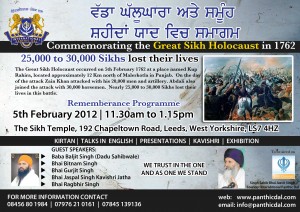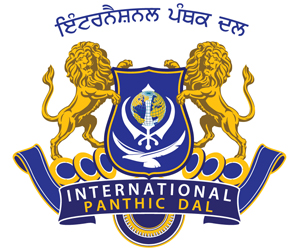Commemorating the Great Sikh Holocaust in 1762
The Great Holocaust of Sikh history is known to Sikhs as Vadda Ghallughara. The 18th century Afghani invader Ahmad Shah Abdali led his sixth major assault against the Sikhs in 1762 A.D. The Shah’s general Nur ud-Din Bamezai had suffered defeat in battle with the Sikhs who set up Jassa Singh Ahluvalia as the regent of Lahore, in what is now Pakistan. Endeavoring to wipe out Sikh resistance, the Shah led his troupes from Qandahar of Afghanistan in a conquest to overtake a cavalcade of Sikhs comprised of fighting men, women, children, and the elderly, in transition from Malva to the interior of India. The Sikh warriors formed a ring to protect the families they escorted, and fought furiously as they pressed onward. Despite valiant efforts, the Sikhs succumbed in a bloody battle close to the village of Kup, in the vicinity of Malerkotia. On February 5, 1762 an estimated 10,000 – 12, 000 Singhs and about 20,000 Sikh women and children died, none escaped without being wounded. Altogether, between 25,000 – 32,000 Sikh martyrs lhai ost their lives in the vicious massacre which has since been called Vadda Ghallughara, or the Great Holocaust.
Programme: 5th February 2012
Location: 192 Chapeltown Road, Leeds, West Yorkshire, LS7 4HZ
Time: 11.30am -1.15pm
Talks in English | Presentations | Exhibition |









